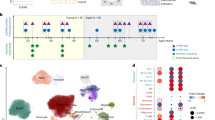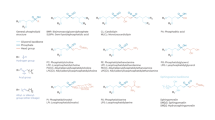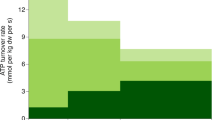Abstract
OBJECTIVE: In rodents, adaptive thermogenesis in response to cold exposure and high-fat feeding is accomplished by the activation of the brown adipose tissue specific mitochondrial uncoupling protein, UCP1. The recently discovered human uncoupling protein 3 is a possible candidate for adaptive thermogenesis in humans. In the present study we examined the effect of mild cold exposure on the mRNA and protein expression of UCP3.
SUBJECTS: Ten healthy male volunteers (age 24.4±1.6 y; height 1.83±0.02 m; weight 77.3±3.0 kg; percentage body fat 19±2)
DESIGN: Subjects stayed twice in the respiration chamber for 60 h (20.00–8.00 h); once at 22°C (72°F), and once at 16°C (61°F). After leaving the respiration chamber, muscle biopsies were taken and RT-competitive-PCR and Western blotting was used to measure UCP3 mRNA and protein expression respectively.
RESULTS: Twenty-four-hour energy expenditure was significantly increased at 16°C compared to 22°C (P<0.05). At 16°C, UCP3T (4.6±1.0 vs 7.7±1.5 amol/µg RNA, P=0.07), UCP3L (2.0±0.5 vs 3.5±0.9 amol/µg RNA, P=0.1) and UCP3S (2.6±0.6 vs 4.2±0.7 amol/µg RNA, P=0.07) mRNA expression tended to be lower compared with at 22°C, whereas UCP3 protein content was, on average, not different. However, the individual differences in UCP3 protein content (16–22°C) correlated positively with the differences in 24 h energy expenditure (r=0.86, P<0.05).
CONCLUSION: The present study suggests that UCP3 protein content is related to energy metabolism in humans and might help in the metabolic adaptation to cold exposure. However, the down-regulation of UCP3 mRNA with mild cold exposure suggests that prolonged cold exposure will lead to lower UCP3 protein content. What the function of such down-regulation of UCP3 could be is presently unknown.
This is a preview of subscription content, access via your institution
Access options
Subscribe to this journal
Receive 12 print issues and online access
$259.00 per year
only $21.58 per issue
Buy this article
- Purchase on Springer Link
- Instant access to full article PDF
Prices may be subject to local taxes which are calculated during checkout




Similar content being viewed by others
References
Enerback S, Jacobsson A, Simpson EM, Guerra C, Yamashita H, Harper M-E, Kozak LP . Mice lacking mitochondrial uncoupling protein are cold-sensitive but not obese Nature Genet 1997 387: 90–94.
Nicholls DG, Locke RM . Thermogenic mechanisms in brown fat Physiol Rev 1984 64: 1–64.
Boss O, Samec S, Paoloni-Giacobino A, Rossier C, Dulloo A, Seydoux J, Muzzin P, Giacobino J-P . Uncoupling protein-3: a new member of the mitochondrial carrier family with tissue-specific expression FEBS Lett 1997 408: 39–42.
Bouchard C, Pérusse L, Chagnon YC, Warden G, Ricquier D . Linkage between markers in the vicinity of the uncoupling protein 2 gene and resting metabolic rate in humans Hum Mol Genet 1997 6: 1887–1889.
Walder K, Norman RA, Hanson RL, Schrauwen P, Neverova M, Jenkinson CP, Easlick J, Warden CH, Pecqueur C, Raimbault S . Association between uncoupling protein polymorphisms (UCP2–UCP3) and energy metabolism/obesity in Pima Indians Hum Mol Genet 1998 7: 1431–1435.
Schrauwen P, Xia J, Bogardus C, Pratley R, Ravussin E . Skeletal muscle UCP3 expression is a determinant of energy expenditure in Pima Indians Diabetes 1999 48: 146–149.
Lin B, Coughlin S, Pilch PF . Bidirectional regulation of uncoupling protein-3 and GLUT-4 mRNA in skeletal muscle by cold Am J Physiol 1998 275: E386–E391.
Gong DW, Monemdjou S, Gavrilova O, Leon LR, Marcus-Samuels B, Chou CJ, Everett C, Kozak LP, Li C, Deng C . Lack of obesity and normal response to fasting and thyroid hormone in mice lacking uncoupling protein-3 J Biol Chem 2000 275: 16251–16257.
Vidal-Puig AJ, Grujic D, Zhang CY, Hagen T, Boss O, Ido Y, Szczepanik A, Wade J, Mootha V, Cortright R . Energy metabolism in uncoupling protein 3 gene knockout mice J Biol Chem 2000 275: 16258–16266.
Clapham JC, Arch JR, Chapman H, Haynes A, Lister C, Moore GB, Piercy V, Carter SA, Lehner I, Smith SA . Mice overexpressing human uncoupling protein-3 in skeletal muscle are hyperphagic and lean Nature 2000 406: 415–418.
Dauncey MJ . Influence of mild cold on 24 h energy expenditure, resting metabolism and diet-induced thermogenesis Br J Nutr 1981 45: 257–267.
Blaza S, Garrow JS . Thermogenic response to temperature, exercise and food stimuli in lean and obese women, studied by 24 h direct calorimetry Br J Nutr 1983 49: 171–180.
Schrauwen P, Schaart G, Saris WHM, Slieker LJ, Glatz JFC, Vidal H, Blaak EE . The effect of weight reduction on skeletal muscle UCP2 and UCP3 mRNA expression and UCP3 protein content in type II diabetic subjects Diabetologia 2000 43: 1408–1416.
Hesselink MKC, Keizer HA, Borghouts LB, Schaart G, Kornips CFP, Slieker LJ, Sloop KW, Saris WHM, Schrauwen P . Protein expression of UCP3 differs between human type 1, type 2a and type 2b fibers FASEB J 2001 15: 10.1096/fj.00–0517fje
Schoffelen PF, Westerterp KR, Saris WH, Ten Hoor F . A dual-respiration chamber system with automated calibration J Appl Physiol 1997 83: 2064–2072.
Weir JB . New methods for calculating metabolic rate with special reference to protein metabolism J Physiol 1949 109: 1–9.
ISO 9920 . 1995 Ergonomics of the thermal environment—estimation of the thermal insulation and evaporative resistance of a clothing ensemble IOS: Geneva
Stichting-Nederlands-Voedingsstoffenbestand . NEVO Tabel Voorlichtingsbureau voor de voeding: Den Haag 1993.
Siri WE . The gross composition of the body Adv Biol Med Physiol 1956 4: 239–280.
Bergstrom J, Hermansen L, Hultman E, Saltin B . Diet, muscle glycogen and physical performance Acta Physiol Scand 1967 71: 140–150.
Chomozynski P, Sacchi N . Single-step method of RNA isolation by acid guanidinium thiocyanate-phenol-chloroform extraction Anal Biochem 1987 162: 156–159.
Millet L, Vidal H, Andreelli F, Larrouy D, Riou J-P, Ricquier D, Laville M, Langin D . Increased uncoupling protein-2 and-3 mRNA expression during fasting in obese and lean humans J Clin Invest 1997 100: 2665–2670.
Millet L, Vidal H, Larrouy D, Andreelli F, Laville M, Langin D . mRNA expression of the long and short forms of uncoupling protein-3 in obese and lean humans Diabetologia 1998 41: 829–832.
Laemmli UK . Cleavage of structural proteins during the assembly of the head of bacteriophage T4 Nature 1970 227: 680–685.
Towbin H, Staehelin T, Gordon J . Electrophoretic transfer of proteins from polyacrylamide gels to nitrocellulose sheets: procedure and some applications Proc Natl Acad Sci USA 1979 76: 4350–4354.
Ravussin E, Lillioja S, Anderson TE, Christin L, Bogardus C . Determinants of 24-hour energy expenditure in man. Methods and results using a respiratory chamber J Clin Invest 1986 78: 1568–1578.
Boss O, Muzzin P, Giacobino J-P . The uncoupling proteins, a review Eur J Endocrinol 1998 139: 1–9.
Schrauwen P, Walder K, Ravussin E . Human uncoupling proteins and obesity Obes Res 1999 7: 97–105.
Astrup A, Bulow J, Madsen J, Christensen NJ . Contribution of BAT and skeletal muscle to thermogenesis induced by ephedrine in man Am J Physiol Endocrinol Metab 1985 248: E507–515.
Schrauwen P, Troost FJ, Xia J, Ravussin E, Saris WHM . Skeletal muscle UCP2 and UCP3 expression in trained and untrained male subjects Int J Obes Relat Metab Disord 1999 23: 966–972.
Barbe P, Larrouy D, Boulanger C, Chevillotte E, Viguerie N, Thalamas C, Trastoy MO, Roques M, Vidal H, Langin D . Triiodothyronine-mediated upregulation of UCP2 and UCP3 mRNA expression in human skeletal muscle without coordinated induction of mitochondrial respiratory chain genes FASEB J 2001 15: 13–15.
Cline GW, Vidal-Puig AJ, Dufour S, Cadman KS, Lowell BB, Shulman GI . In vivo effects of uncoupling protein-3 gene disruption on mitochondrial energy metabolism J Biol Chem 2001 276: 20240–20244.
Schrauwen P, Marken Lichtenbelt WD van, Westerterp KR . Energy balance in a respiration chamber: individual adjustment of energy intake to energy expenditure Int J Obes Relat Metab Disord 1997 21: 769–774.
Marken Lichtenbelt WD van, Schrauwen P, Westerterp-Plantenga MS . Individual variation in the relation between body temperature and energy expenditure in response to mild cold (Submitted).
Nedergaard J, Golozoubova V, Matthias A, Asadi A, Jacobsson A, Cannon B . UCP1: the only protein able to mediate adaptive non-shivering thermogenesis and metabolic inefficiency Biochim Biophys Acta 2001 1504: 82–106.
Khalfallah Y, Fages S, Laville M, Langin D, Vidal H . Regulation of uncoupling protein-2 and uncoupling protein-3 mRNA expression during lipid infusion in human skeletal muscle and subcutaneous adipose tissue Diabetes 2000 49: 25–31.
Maickel RP, Westermann EO, Brodie BB . Effects of reserpine and cold-exposure on pituitary-adrenocortical function in rats J Pharmac Exp Ther 1961 134: 167–175.
Schrauwen P, Saris WHM, Hesselink MKC . An alternative function for human uncoupling protein 3: protection of mitochondria against accumulation of non-esterified fatty acids inside the mitochondrial matrix FASEB J 2001 15: 2497–2502.
Acknowledgements
Dr Schrauwen is supported by a grant from The Netherlands Organization for Scientific Research (NWO). We thank Eli Lilly and Company for providing us with the UCP3 antibody. Dr H Vidal is kindly thanked for providing us with the UCP cDNA competitors.
Author information
Authors and Affiliations
Corresponding author
Rights and permissions
About this article
Cite this article
Schrauwen, P., Westerterp-Plantenga, M., Kornips, E. et al. The effect of mild cold exposure on UCP3 mRNA expression and UCP3 protein content in humans. Int J Obes 26, 450–457 (2002). https://doi.org/10.1038/sj.ijo.0801943
Received:
Revised:
Accepted:
Published:
Issue Date:
DOI: https://doi.org/10.1038/sj.ijo.0801943
Keywords
This article is cited by
-
Physiological and molecular mechanisms of cold-induced improvements in glucose homeostasis in humans beyond brown adipose tissue
International Journal of Obesity (2023)
-
The relationship between dietary phytochemical index and resting metabolic rate mediated by inflammatory factors in overweight and obese women: a cross-sectional study
BMC Women's Health (2022)
-
Reproducibility and associations with obesity and insulin resistance of circadian-rhythm parameters in free-living vs. controlled conditions during the PREVIEW lifestyle study
International Journal of Obesity (2021)
-
Targeting thermogenesis in brown fat and muscle to treat obesity and metabolic disease
Nature Reviews Endocrinology (2018)
-
Cold-induced thermogenesis in humans
European Journal of Clinical Nutrition (2017)



